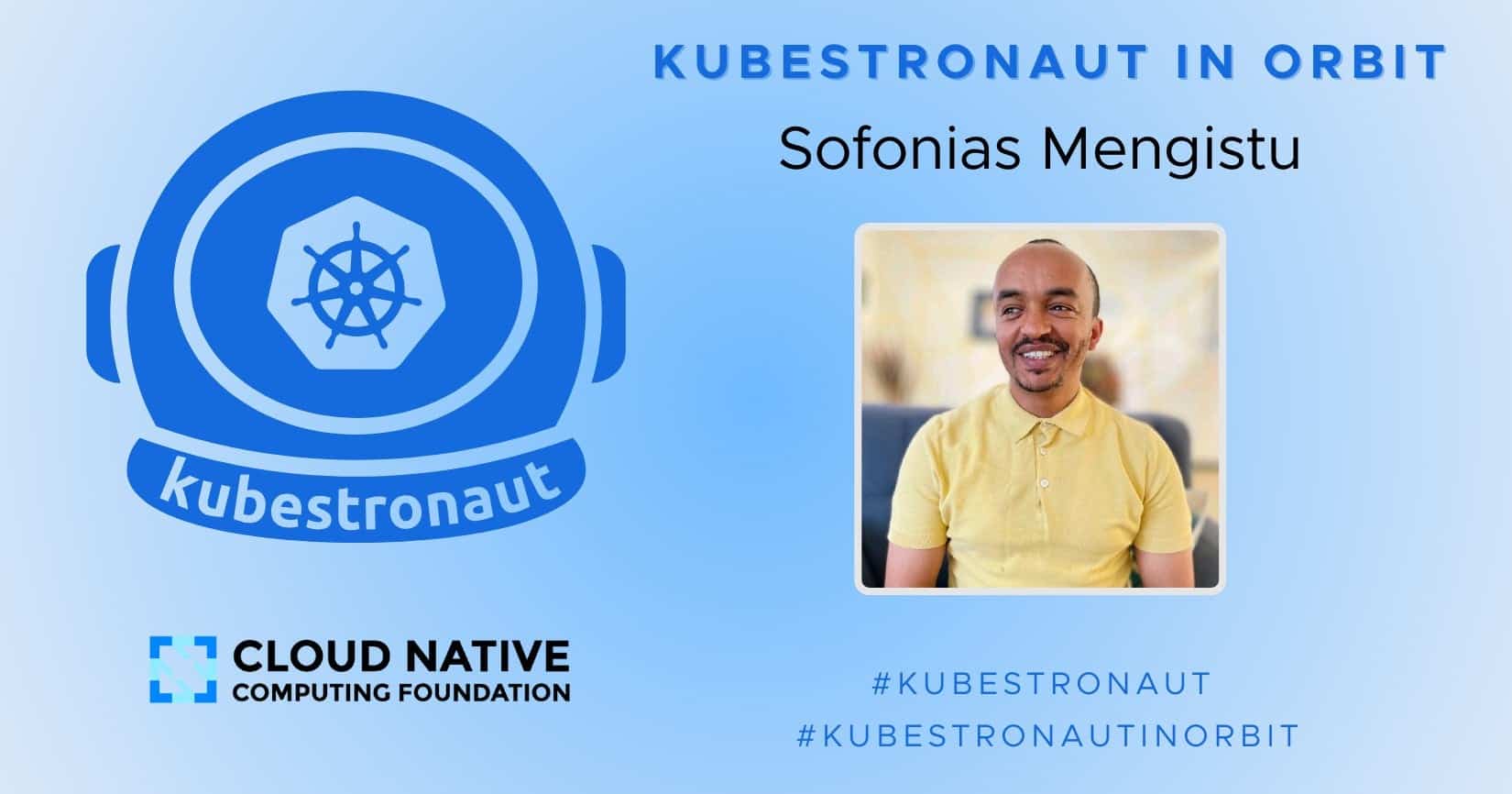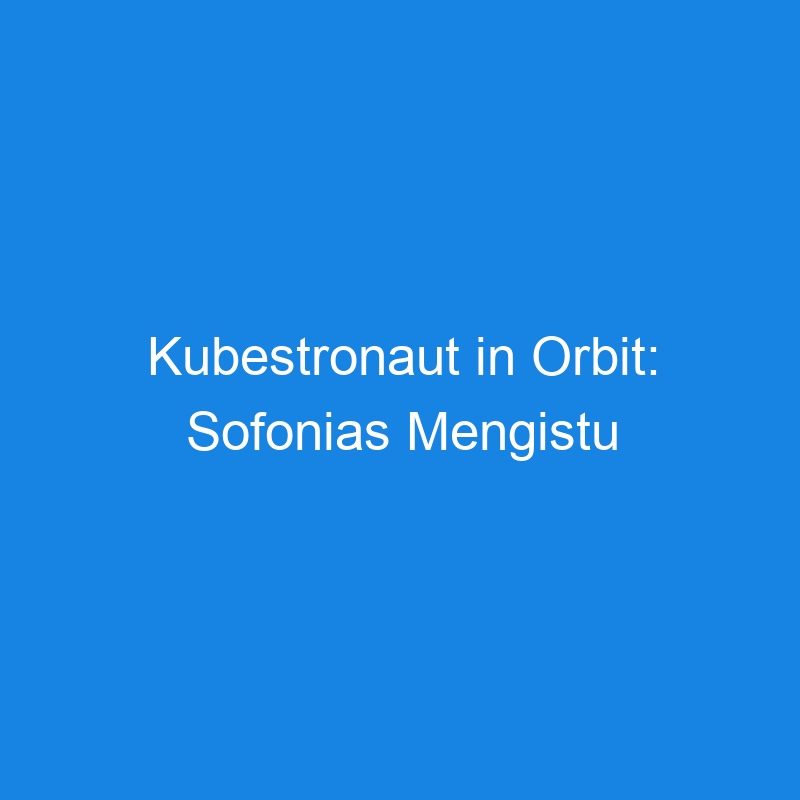
Get to know Sofonias
This week’s Kubestronaut in Orbit is Sofonias Mengistu, a DevOps Engineer at Gebeya.INC based in Addis Ababa, Ethiopia. With 14 years of IT experience—five of those dedicated to cloud-native technologies—Sofonias has led numerous projects focused on implementing, managing, and securing Kubernetes environments. He got his start in networking, but his passion for DevOps inspired a career transition, allowing him to dive deeper into the cloud-native ecosystem. Sofonias is also an active contributor to the CNCF community, frequently participating in project meetups and webinars to share knowledge and collaborate with peers.
If you’d like to be a Kubestronaut like Sofonias, get more details on the CNCF Kubestronaut page.
When did you get started with Kubernetes and/or cloud-native? What was your first project?
I began my journey with cloud and cloud-native technologies in 2018, using AWS as my first platform in a lab environment, primarily for study purposes. My early focus was on deploying static applications, and soon after, I delved into containerization with Docker and version control using GitHub. In 2021, after a friend recommended Kubernetes, I took on my first project, setting up an infrastructure and deploying a voting app on EKS using eksctl, which was a valuable hands-on learning experience. Since then, I have completed the KodeKloud Engineer program, up to the DevOps Architect level, where I’ve gained expertise through real-world DevOps tasks.
What are the primary CNCF projects you work on or use today? What projects have you enjoyed the most in your career?
I’ve had the opportunity to work with several key CNCF projects, starting with Kubernetes. Some of the others I’ve utilized include ArgoCD, Flux, Prometheus, CRI-O, CoreDNS, Istio, OpenTelemetry, PostgreSQL, and Kyverno. This is just a snapshot of my experience; I’ve explored various CNCF projects throughout my career.
How have the certs or CNCF helped you in your career?
CNCF certifications have been instrumental in my career growth. They’ve validated my skills, opened doors to new opportunities, and helped me stand out in the competitive job market. In a short period, I’ve been able to secure senior positions and contribute significantly to projects thanks to my certifications.
What are some other books/sites/courses you recommend for people who want to work with k8s?
For beginners, Tech with Nana on YouTube is an excellent resource, and you should quickly move on to Mumshad Mannambeth’s 8-minute video (he also has CNCF endorsed content on Udemy). For the Kubernetes and Cloud Native Associate (KCNA) certification, KodeKloud is the best platform to start with. Back when I started, there wasn’t a KCNA certificate, so I began with CKA on KodeKloud, but now students should first gain basic Kubernetes knowledge with KCNA. KodeKloud or Udemy courses (check out the CNCF endorsed content), especially “Kubernetes from Scratch” by Mohamed, along with KodeKloud’s PDFs, are highly recommended.
For intermediate learners, focus on the Certified Kubernetes Administrator (CKA) certification with KodeKloud and complete all tasks. After that, practice on Killer.sh, and study books related to Kubernetes. You should also check out Tech with Nana’s 3.5-hour course on YouTube for further insights. Ensure you achieve at least 85 on Killer.sh to be well-prepared for the exam. After CKA, move on to Certified Kubernetes Application Developer (CKAD), using KodeKloud and Killer.sh for practice. Additionally, explore content on GitHub and work on DevOps projects from YouTube to gain practical experience. Feel free to reach out to me on LinkedIn for project recommendations.
For advanced learners, Certified Kubernetes Security Specialist (CKS) is the next step, and you can use free resources like Killer.sh on YouTube, KodeKloud, and GVR videos by Venkata Ramana Gali. These are excellent materials for advanced CKS preparation. The CKS requires more in-depth knowledge, which is why it’s considered advanced.
Finally, aim for the Kubernetes and Cloud Security Associate (KCSA) certification, which can be completed in two weeks using the same materials you used for CKS.
What do you do in your free time?
I mainly study various tools in my free time, focusing on deploying lab-based applications on Azure, AWS, or GCP platforms. In addition to tech, I enjoy staying active through sports—biking, boxing, and swimming are my favorite activities that I regularly engage in.
What would you tell someone who is just starting their K8s certification journey? Any tips or tricks?
Honestly, I don’t have any secret tricks. I mainly use LinkedIn for networking and professional development. I often connect with people who have passed the certifications I’m interested in, and I ask them various questions beyond the exam content. My goal is not just to gather information, but also to explore potential job opportunities or collaborations. Remember, there’s no shortcut to success in Kubernetes. It requires dedication, hard work, and using reliable resources.
Today the Cloud native ecosystem is way more than Kubernetes. Do you plan to get other cloud native certifications from the CNCF ?
Yes! I’m interested in both the Prometheus Certified Associate (PCA), as well as the Linux Foundation Certified System Administrator (LFCS) and GitOps Certified Associate (CGOA) certs, and last but not least, a FinOps Certification.
